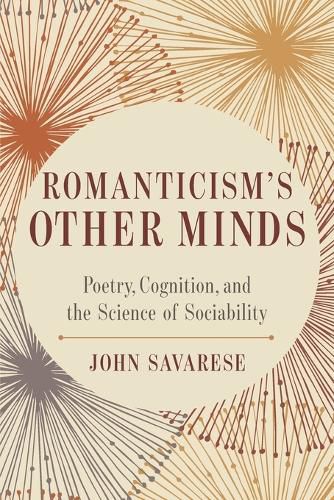Readings Newsletter
Become a Readings Member to make your shopping experience even easier.
Sign in or sign up for free!
You’re not far away from qualifying for FREE standard shipping within Australia
You’ve qualified for FREE standard shipping within Australia
The cart is loading…






This title is printed to order. This book may have been self-published. If so, we cannot guarantee the quality of the content. In the main most books will have gone through the editing process however some may not. We therefore suggest that you be aware of this before ordering this book. If in doubt check either the author or publisher’s details as we are unable to accept any returns unless they are faulty. Please contact us if you have any questions.
In Romanticism's Other Minds: Poetry, Cognition, and the Science of Sociability, John Savarese reassesses early relationships between Romantic poetry and the sciences, uncovering a prehistory of cognitive approaches to literature and demonstrating earlier engagement of cognitive approaches than has heretofore been examined at length. Eighteenth- and early nineteenth-century writers framed poetry as a window into the mind's original, underlying structures of thought and feeling. While that Romantic argument helped forge a well-known relationship between poetry and introspective or private consciousness, Savarese argues that it also made poetry the staging ground for a more surprising set of debates about the naturally social mind. From James Macpherson's forgeries of ancient Scottish poetry to Wordsworth's and Coleridge's Lyrical Ballads, poets mined traditional literatures and recent scientific conjectures to produce alternate histories of cognition, histories that variously emphasized the impersonal, the intersubjective, and the collective. By bringing together poetics, philosophy of mind, and the physiology of embodied experience--and with major studies of James Macpherson, Anna Letitia Barbauld, William Wordsworth, and Walter Scott--Romanticism's Other Minds recovers the interdisciplinary conversations at the heart of Romantic-era literary theory.
$9.00 standard shipping within Australia
FREE standard shipping within Australia for orders over $100.00
Express & International shipping calculated at checkout
This title is printed to order. This book may have been self-published. If so, we cannot guarantee the quality of the content. In the main most books will have gone through the editing process however some may not. We therefore suggest that you be aware of this before ordering this book. If in doubt check either the author or publisher’s details as we are unable to accept any returns unless they are faulty. Please contact us if you have any questions.
In Romanticism's Other Minds: Poetry, Cognition, and the Science of Sociability, John Savarese reassesses early relationships between Romantic poetry and the sciences, uncovering a prehistory of cognitive approaches to literature and demonstrating earlier engagement of cognitive approaches than has heretofore been examined at length. Eighteenth- and early nineteenth-century writers framed poetry as a window into the mind's original, underlying structures of thought and feeling. While that Romantic argument helped forge a well-known relationship between poetry and introspective or private consciousness, Savarese argues that it also made poetry the staging ground for a more surprising set of debates about the naturally social mind. From James Macpherson's forgeries of ancient Scottish poetry to Wordsworth's and Coleridge's Lyrical Ballads, poets mined traditional literatures and recent scientific conjectures to produce alternate histories of cognition, histories that variously emphasized the impersonal, the intersubjective, and the collective. By bringing together poetics, philosophy of mind, and the physiology of embodied experience--and with major studies of James Macpherson, Anna Letitia Barbauld, William Wordsworth, and Walter Scott--Romanticism's Other Minds recovers the interdisciplinary conversations at the heart of Romantic-era literary theory.